Pablo de Ronda first went to Spain in 1970, aged 20. Now, 53 years later, he has been living in Spain, in Andalucia, for the last 15 years. In the intervening years he has visited most parts of the country; every region, in fact, except Galicia. Along the way, many of these places have had a particular significance for this avid hispanist. Here are his reminiscences.
Barcelona to the Basque Country
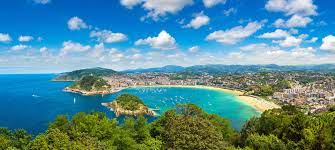 I first came to Spain when, together with six other Spanish language students, I flew to Barcelona at the start of our ‘year abroad’ which was a compulsory part of our languages degree. This was in 1970.
I first came to Spain when, together with six other Spanish language students, I flew to Barcelona at the start of our ‘year abroad’ which was a compulsory part of our languages degree. This was in 1970.
We were going to San Sebastian (Basque country), and back then the easiest way was a flight to the Catalan capital and then by train across northern Spain to our final destination.
Well, we hadn’t taken account of the fact that it was Easter. When we tried to buy train tickets, all trains were fully booked! An alien concept for those of us used to half-empty British Rail trains. What to do?
Finally, we decided to hire a car – a big car, there were seven of us, three of us strapping lads. We got a large SEAT sedan based on the old Morris Oxford. Incredibly, I was the only one with a driving licence.
Many hours later – no motorways in Spain then – we arrived late at night in the Guipuzcoa capital to the sounds of Santana on the juke boxes and wine at two pesetas. We found accommodation in a fonda in the port and woke the following day to bright sunshine, the roar of the waves and a massive hangover.
The following day we went hunting for long-term digs and enrolled at the university, where we were to do a course for three months.
I loved San Sebastian. An elegant and classy Victorian resort, it was way different from anything I’d experienced before.
We did the course and we did the Parte Vieja – every night. Wow, what a place. The pintxos (tapas) were to die for and the drinks so cheap. I mentioned the wine, but beer was also cheap, just eight pesetas for a caña.
By the time the course was over, I had found myself a job in the office of a local tour operator. I was soon promoted to guide, which entailed collecting British and Irish catholic pilgrims from Lourdes in France and bringing them by coach to SanSe for a knees-up after all those "Hail Marys" in the French pilgrim site. We sold them excursions and showed them the highlights of the area.
I was so successful (apparently) tha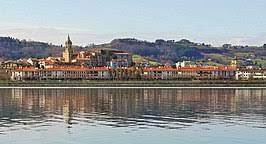 t I was invited back for the summer season for the next several years.
t I was invited back for the summer season for the next several years.
San Sebastian is therefore on my list of special places in Spain, as is nearby Fuenterrabia (now Hondarribia) where a lot of my tourist work was focused. Many years later, aged 48, I was to return there with a girlfriend and we stayed in the Parador hotel, surely one of the best historic paradors in the whole of Spain.
Photos courtesy of spain.info and Wikipedia
El Prat de Llobregat
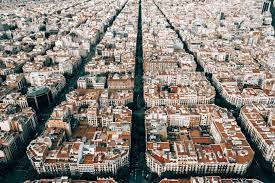 The town near Barcelona which is the home of the city’s airport. So, I had been there on that first trip to Spain back in 1970.
The town near Barcelona which is the home of the city’s airport. So, I had been there on that first trip to Spain back in 1970.
This rather shabby and socially deprived town took on a greater significance for me after I organised a successful work experience programme for sixth-formers from schools in St Helens, Merseyside, where I worked for the education department, and for older pupils from schools in El Prat.
In the first year of the programme, 1995, I spent a week there monitoring the students, the placements and the menus del dia. Thoroughly worthwhile and enjoyable.
Photo courtesy of El Catalan
Jaca
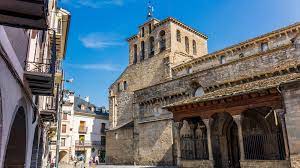 I attended a Spanish refresher course in Jaca (Aragon) in July 1998. Run by the European Union Socrates programme, this was a free course, including accommodation, at the summer school of the University of Zaragoza, aimed at education professionals from other member states of the European Union. [Regrettably, these education programmes are no longer available to UK citizens, thanks to Brexit.]
I attended a Spanish refresher course in Jaca (Aragon) in July 1998. Run by the European Union Socrates programme, this was a free course, including accommodation, at the summer school of the University of Zaragoza, aimed at education professionals from other member states of the European Union. [Regrettably, these education programmes are no longer available to UK citizens, thanks to Brexit.]
The course was excellent and certainly brushed up my Spanish, which had grown rusty over the years. The scenery round about, the vibrancy and the social life all contributed to a fabulous fortnight. Plus a beautiful "holiday" romance.
Photo courtesy of Traveler
Ronda and Montejaque
In 2000 it was my silver wedding anniversary. My wife and I decided to do a tour of Andalucia, a region we hardly knew at that point.
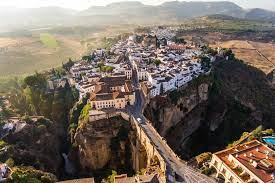 We flew to Malaga, hired a car, had breakfast in old Marbella, then wound our way up to Ronda where we had booked two nights at the Parador hotel. It was August, very hot, but the cool modern parador with its gardens and pool were very welcome. Our room overlooked the Tajo and the valley below and the mountains of the Sierra de Grazalema formed a stunning backdrop.
We flew to Malaga, hired a car, had breakfast in old Marbella, then wound our way up to Ronda where we had booked two nights at the Parador hotel. It was August, very hot, but the cool modern parador with its gardens and pool were very welcome. Our room overlooked the Tajo and the valley below and the mountains of the Sierra de Grazalema formed a stunning backdrop.
We enjoyed our two days in Ronda then continued on our way via the pueblos blancos Benaojan, Montejaque, to Arcos de la Frontera and Jerez de la Frontera and then Cadiz. We stayed a night each in the Parador hotels in Arcos – fantastic – and Cadiz – disappointing. Then north via Sevilla and Carmona to Granada and Cordoba, where again we lodged in the Parador hotel.
On our penultimate day it was south to Roman Antequera, where we managed to swim in the Parador pool, even though we weren’t guests.
Back to Malaga for a night in the stunning Gibralfaro Parador above the city before flying home to Liverpool John Lennon airport.
All the places we went to on that tour we have since revisited and they are all lovely. But the two which are special to me are Ronda and Montejaque.
My first wife and I bought an apartment in Ronda the year after our Grand Tour, which we enjoyed as a family for many years. It remained with me long after our divorce in 2005, until I sold it in 2019.
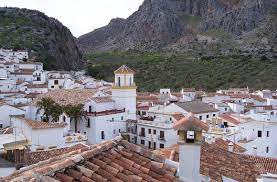 As a single man, and early retired, I fancied moving to Ronda to live, but that didn’t work out until in 2008 I met the “Lovely Rita, Meter Maid”, a German living in Montejaque. It was not long before I emigrated to live with her in her house there, we got married in 2010 and moved to a big villa just outside Ronda in 2011. The rest is history.
As a single man, and early retired, I fancied moving to Ronda to live, but that didn’t work out until in 2008 I met the “Lovely Rita, Meter Maid”, a German living in Montejaque. It was not long before I emigrated to live with her in her house there, we got married in 2010 and moved to a big villa just outside Ronda in 2011. The rest is history.
Ronda and Montejaque are evidently two very special places for me.
Photos courtesy of Trendencias and Ayuntamiento de Montejaque
Oviedo
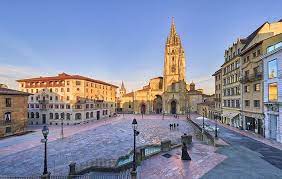 Stepping back to 2005, when I was still working as a schools adviser and inspector, by now for Sefton Council in Merseyside, I went on a study visit to Asturias, again funded by the European Union.
Stepping back to 2005, when I was still working as a schools adviser and inspector, by now for Sefton Council in Merseyside, I went on a study visit to Asturias, again funded by the European Union.
We were a group of European educationalists looking at foreign language teaching in primary schools in Asturias.
We were based in Oviedo but we also visited Gijon and other towns and villages to sample primary English lessons.
The professional side of the study visit was very thought-provoking and interesting and well worthwhile. The social side was also fun: I enjoyed the Asturian cider (sidra), the local food and the company of a very vivacious Dutch headteacher.
That’s why Oviedo is on my list.
Photo courtesy of Turismo Asturias
Frigiliana
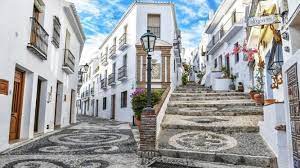 In 2021, while my wife was away in Germany recovering from a very nasty bout of Covid-19, I took myself off for a few days to Frigiliana, arguably the most beautiful of all the white villages in Malaga province.
In 2021, while my wife was away in Germany recovering from a very nasty bout of Covid-19, I took myself off for a few days to Frigiliana, arguably the most beautiful of all the white villages in Malaga province.
I was accompanied by Berti, my dog, since then deceased, sadly. Hit and run.
Despite a third of the population of Frigiliana being foreign, it didn’t seem over-run or oppressive, unlike the nearby coastal resort of Nerja.
Berti and I had a great time together and we vowed to return.
When my wife came back to me, recovered, from her homeland, I took her away to Frigiliana for a week to celebrate my 71st birthday. We had a great week, toured around and ate well.
We went for a third time with friends last year, just for lunch, and it was once again a lovely experience.
Definitely worth its place on my list.
Photo courtesy of Malaga Hoy
Extremadura
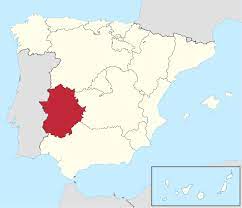 19 years since my last visit to the region, it was time for me to revisit Extremadura. This time I wanted to check out all seven of the paradores located in the region. And I wanted to show my wife Rita this beautiful part of Spain, which is located slightly off the beaten track.
19 years since my last visit to the region, it was time for me to revisit Extremadura. This time I wanted to check out all seven of the paradores located in the region. And I wanted to show my wife Rita this beautiful part of Spain, which is located slightly off the beaten track.
I bought a Five-Night Card, for just 600€. That works out at 120€ per night, breakfast included, and 20% discount on all food purchased in the parador.
I am also an Amigo de Paradores which means there are certain perks like discounted parking, a welcome drink on arrival, and occasional special offers such as tours or other activities.
In addition, for every 3 euros spent you get a point. And what do points mean? Prizes! Well, in the case of this loyalty scheme, you can exchange points for accommodation or meals. In the old days I had many a free night’s accommodation for my accumulated Amigo points.
We visited all seven paradores and stayed overnight in four: Zafra, Jarandilla de la Vera, Trujillo and Merida.
For the overall beauty of the region and their exquisite paradores, plus a previous very enjoyable visit with my first wife and son, I have to regard Extremadura as a very special place.
Map courtesy of Wikipedia
To read more about both visits click here:
Journey to the hard extreme – Extremadura – Part 1 (eyeonspain.com)
Journey to the hard extreme – Extremadura – Part 2 (eyeonspain.com)
Madrid and Toledo
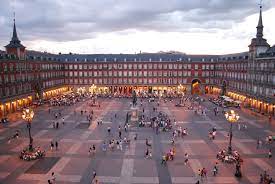 The Spanish say about their national capital: “De Madrid al Cielo”. In English we say: “See Naples and die!” The sentiment being that Madrid/Naples are such beautiful cities that you can go ahead and die, as nowhere else compares.
The Spanish say about their national capital: “De Madrid al Cielo”. In English we say: “See Naples and die!” The sentiment being that Madrid/Naples are such beautiful cities that you can go ahead and die, as nowhere else compares.
Well, I wouldn’t go that far, although Madrid is indeed stunning and spectacular in so many ways.
I’d been on two previous occasions, the first time accompanying my then wife on a business trip, the second to attend an international conference on school inspections. But we had little time to explore the city.
On this occasion I took my now wife Rita to buy a second-hand car! We turned it into a short break and loved it. Rita, who has travelled widely in her life, declared it the most beautiful city she has ever visited. I can’t agree with that, although Rita has never been to Budapest, Paris, Prague nor Vienna.
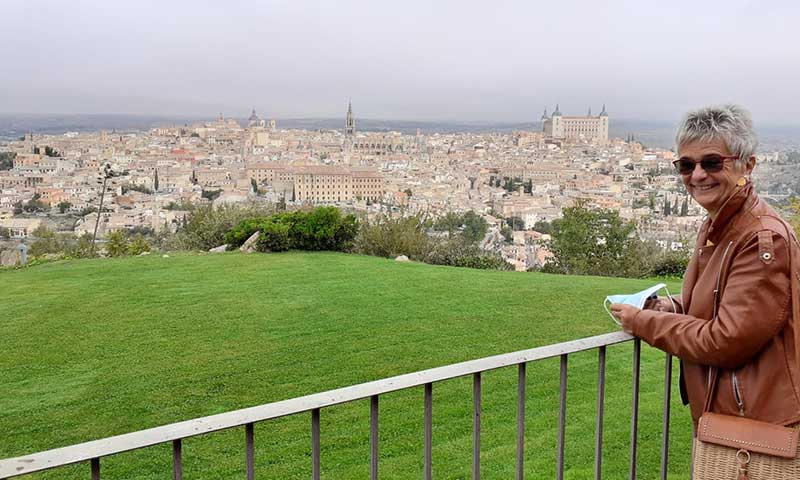 By the way, we bought the car, and travelled back to Andalucia by road. We stopped for a night in Toledo which was enough time to explore this wonderful city, erstwhile capital of Spain. This was also new for Rita. She loved that too, except for the night we got lost. The least said about that the better.
By the way, we bought the car, and travelled back to Andalucia by road. We stopped for a night in Toledo which was enough time to explore this wonderful city, erstwhile capital of Spain. This was also new for Rita. She loved that too, except for the night we got lost. The least said about that the better.
So, Madrid and Toledo are special places for me, since I got to enjoy them with my lovely Meter Maid.
Photos courtesy of Wikipedia and Paul Whitelock
To read more about our car-buying trip, click here:
How to buy a car in Spain - Secret Serrania de Ronda
Tags: Barcelona, Basque Country, degree, El Prat de Llobregat, Extremadura, Frigiliana, Fuenterrabia, German, Hondarribia, Jaca, rJarandilla de la Vera, Madrid, Merida, Montejaque, Nerja, Pablo de Ronda, parador, Rita, Ronda, Salford, San Sebastian, Spanish, Toledo, Trujillo, year abroad, Zafra